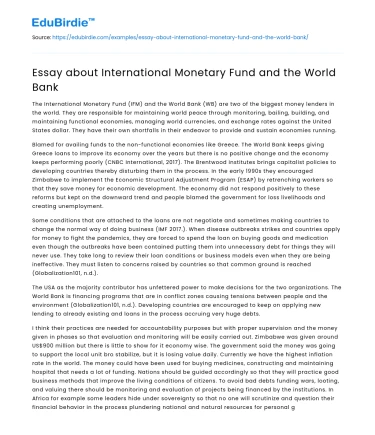The International Monetary Fund (IFM) and the World Bank (WB) are two of the biggest money lenders in the world. They are responsible for maintaining world peace through monitoring, bailing, building, and maintaining functional economies, managing world currencies, and exchange rates against the United States dollar. They have their own shortfalls in their endeavor to provide and sustain economies running.
Blamed for availing funds to the non-functional economies like Greece. The World Bank keeps giving Greece loans to improve its economy over the years but there is no positive change and the economy keeps performing poorly (CNBC International, 2017). The Brentwood institutes brings capitalist policies to developing countries thereby disturbing them in the process. In the early 1990s they encouraged Zimbabwe to implement the Economic Structural Adjustment Program (ESAP) by retrenching workers so that they save money for economic development. The economy did not respond positively to these reforms but kept on the downward trend and people blamed the government for loss livelihoods and creating unemployment.
Save your time!
We can take care of your essay
- Proper editing and formatting
- Free revision, title page, and bibliography
- Flexible prices and money-back guarantee
Some conditions that are attached to the loans are not negotiate and sometimes making countries to change the normal way of doing business (IMF 2017.). When disease outbreaks strikes and countries apply for money to fight the pandemics, they are forced to spend the loan on buying goods and medication even though the outbreaks have been contained putting them into unnecessary debt for things they will never use. They take long to review their loan conditions or business models even when they are being ineffective. They must listen to concerns raised by countries so that common ground is reached (Globalization101, n.d.).
The USA as the majority contributor has unfettered power to make decisions for the two organizations. The World Bank is financing programs that are in conflict zones causing tensions between people and the environment (Globalization101, n.d.). Developing countries are encouraged to keep on applying new lending to already existing and loans in the process accruing very huge debts.
I think their practices are needed for accountability purposes but with proper supervision and the money given in phases so that evaluation and monitoring will be easily carried out. Zimbabwe was given around US$900 million but there is little to show for it economy wise. The government said the money was going to support the local unit bro stabilize, but it is losing value daily. Currently we have the highest inflation rate in the world. The money could have been used for buying medicines, constructing and maintaining hospital that needs a lot of funding. Nations should be guided accordingly so that they will practice good business methods that improve the living conditions of citizens. To avoid bad debts funding wars, looting, and valuing there should be monitoring and evaluation of projects being financed by the institutions. In Africa for example some leaders hide under sovereignty so that no one will scrutinize and question their financial behavior in the process plundering national and natural resources for personal gain and enrichment.
If l had the power to shape the policies of the IMF and the World Bank, I would start by grouping countries by their needs. Formulate policies that are relevant to each group. Create workable solutions that allows countries in the same group to review, evaluate and analyze each other through collaboration and peer assessing. I would make sure that borrowing should be towards developmental projects, humanitarian support should be sourced from development partners and donor agencies. Policies that discourage exploitation of natural, human, material, and national resources will be put on the fore. Lastly, I would draft policies that do not put nations into huge debts by making sure they live within their means.
References
- CNBC International. (2017, October 12). What's the Difference Between the IMF and the World Bank [Video]. YouTube.
- Globalization101. (n.d.). International Monetary Fund and World Bank. The LEVIN Institute.
- IMF. (2017, July 10). How the IMF Works [Video]. YouTube.






 Stuck on your essay?
Stuck on your essay?

